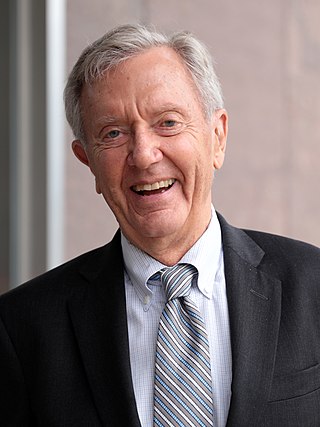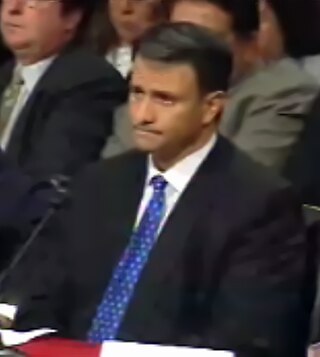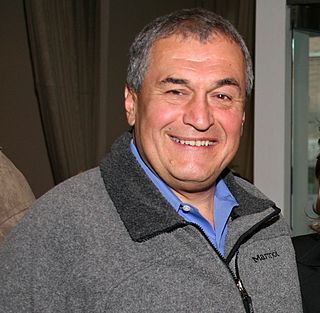Related Research Articles
The Whitewater controversy, Whitewater scandal, Whitewatergate, or simply Whitewater, was an American political controversy during the 1990s. It began with an investigation into the real estate investments of Bill and Hillary Clinton and their associates, Jim and Susan McDougal, in the Whitewater Development Corporation. This failed business venture was incorporated in 1979 with the purpose of developing vacation properties on land along the White River near Flippin, Arkansas.

Bruce Edward Babbitt is an American attorney and politician who served as the 47th United States Secretary of the Interior from 1993 to 2001 under President Bill Clinton. He previously served as the 16th governor of Arizona from 1978 to 1987 and was a candidate for President of the United States in the 1988 Democratic primaries.

Conrad Ray Burns was an American politician who served as a United States Senator from Montana and later became a lobbyist. He was only the second Republican popularly elected to represent Montana in the Senate and was the longest-serving Republican senator in Montana history.

Harold McEwen Ickes is the former White House Deputy Chief of Staff for President Bill Clinton. He was a leading figure in the Clinton administration's healthcare reform initiative.

Rocky Boy's Indian Reservation is one of seven Native American reservations in the U.S. state of Montana. Established by an act of Congress on September 7, 1916, it was named after Ahsiniiwin, the chief of the Chippewa band, who had died a few months earlier. It was established for landless Chippewa (Ojibwe) Indians in the American West, but within a short period of time many Cree (Nēhiyaw) and Métis were also settled there. Today the Cree outnumber the Chippewa on the reservation. The Bureau of Indian Affairs (BIA) recognizes it as the Chippewa Cree Reservation.
The 1996 United States campaign finance controversy, sometimes referred to as Chinagate, was an effort by the People's Republic of China to influence domestic American politics prior to and during the Clinton administration and also involved the fundraising practices of the administration itself.

Jack Allan Abramoff is an American lobbyist, businessman, film producer, writer, and convicted felon. He was at the center of an extensive corruption investigation led by Earl Devaney that resulted in his conviction and 21 other people either pleading guilty or being found guilty, including White House officials J. Steven Griles and David Safavian, U.S. Representative Bob Ney, and nine other lobbyists and congressional aides.

The Grand Traverse Band of Ottawa and Chippewa Indians is a federally recognized Native American tribe located in northwest Michigan on the Leelanau Peninsula. Sam McClellan is the current tribal chairman, elected in June 2016 to a four-year term after succeeding Al Pedwaydon, who served from 2012 to 2016.
The Jack Abramoff Indian lobbying scandal was a United States political scandal exposed in 2005; it related to fraud perpetrated by political lobbyists Jack Abramoff, Ralph E. Reed Jr., Grover Norquist and Michael Scanlon on Native American tribes who were seeking to develop casino gambling on their reservations. The lobbyists charged the tribes an estimated $85 million in fees. Abramoff and Scanlon grossly overbilled their clients, secretly splitting the multi-million dollar profits. In one case, they secretly orchestrated lobbying against their own clients in order to force them to pay for lobbying services.
The monetary influence of Jack Abramoff ran deep in Washington, as Jack Abramoff spent millions of dollars to influence and entertain both Republican and Democratic politicians. Abramoff had a reputation for largesse considered exceptional even by Washington standards. In addition to offering many Republican members of Congress expensive free meals at his restaurant, Signatures, Abramoff maintained four skyboxes at major sports arenas for political entertaining at a cost of over $1 million a year. Abramoff hosted many fundraisers at these skyboxes including events for Republican politicians publicly opposed to gambling, such as John Doolittle. Abramoff gave over $260,000 in personal contributions to Republican candidates, politicians, and organizations, and funded numerous trips for politicians and staffers and gave none to Democrats.
Capitol Campaign Strategies was an American public relations firm run by Michael Scanlon, Tom DeLay's former press secretary, which Scanlon used in coordination with Jack Abramoff to redirect about $40 million in lobbying contributions from Indian tribes to Scanlon, Abramoff, and their associates, as well as funding bribes to Republican politicians such as Bob Ney. Scanlon and Abramoff have pleaded guilty for their activities. After Abramoff left Preston Gates and went to Greenberg Traurig in January 2001, Scanlon formed Capitol Campaign Strategies. Its official location was 611 Pennsylvania Avenue SE in Washington D.C., which is a maildrop. Scanlon also formed the dummy organizations American International Center and Atlantic Research Analysis aka Atlantic Research & Analysis, used to receive and distribute CCS money.
Kevin A. Ring is a former American attorney and congressional staffer; he served Republicans in both the House and the Senate, including U.S. Representative John T. Doolittle (R-CA). He also served as a counsel on the Senate Judiciary Committee's Constitution, Federalism and Property Rights Subcommittee.
The Office of Special Counsel was an office of the United States Department of Justice established by provisions in the Ethics in Government Act that expired in 1999. The provisions were replaced by Department of Justice regulation 28 CFR Part 600, which created the successor office of special counsel. The current regulations were drafted by former acting solicitor general Neal Katyal.
The Commerce Department trade mission controversy was an American political controversy in the 1990s during the Clinton Administration. It refers to the alleged selling of seats on United States federal planes going on international trade missions, for the purpose of raising campaign contributions. No official charges were ever made in conjunction with the allegations but the Commerce Department did change its policies regarding the selection of participants for such missions so they would not be politically based.
The Henry Cisneros payments controversy was a lengthy investigation begun in 1995 into allegations that Henry Cisneros, United States Secretary of Housing and Urban Development during the Presidency of Bill Clinton, had lied to the FBI background check investigators about payments he had made to his former mistress. Independent Counsel David Barrett was appointed to investigate the matter. In 1995 Cisneros was indicted; in 1997 he pleaded guilty to a misdemeanor; in 2001 he was pardoned by President Bill Clinton. The Independent Counsel investigation continued, however, focusing on allegations of obstruction of justice by the Clinton administration. It issued a final report, known as the Barrett Report, in 2006 that did little to resolve matters.
Susan P. Thomases is a New York-based attorney. She served as personal counsel and an informal adviser to Hillary Clinton during the presidency of Bill Clinton. She was a prominent witness during the Senate Whitewater Hearings in 1995. She served as the model for the character Lucille Kaufmann from the 1996 political novel Primary Colors.
Linda Medlar-Jones was a principal figure in a high-profile political sex scandal that triggered an exhaustive 2½ year, multimillion-dollar investigation by the U.S. Office of the Independent Counsel during the first term of U.S. President Bill Clinton. The principal target of the investigation was her former lover, Housing and Urban Development secretary Henry Gabriel Cisneros of San Antonio, Texas.
President Bill Clinton made two appointments to the Supreme Court of the United States, both during his first term.

Anthony Thomas Podesta is an American lobbyist best known for founding the Podesta Group. The brother of former White House Chief of staff John Podesta, he was formerly one of Washington's most powerful lobbyists and fundraisers.
The Lincoln Bedroom for contributors controversy was an American political controversy in the 1990s during the Clinton Administration. It refers to the alleged selling of overnight stays in the Lincoln Bedroom in the White House in return for political campaign contributions. It occurred in the context of the larger and somewhat separately focused 1996 United States campaign finance controversy. Despite allegations of wrongdoing the justice department never opened an investigation or pressed criminal charges in connection to the Lincoln Bedroom matter.
References
- ↑ Publisher, Is A Former (November 14, 2021). "Peter Dykstra: Revisiting ghosts of the Interior's past". EHN. Archived from the original on January 12, 2024. Retrieved January 12, 2024.
- ↑ NY Times Sinking of Casino Plan Makes Tribes Cry Foul September 10, 1997, Late Edition - Final, Section A, Page 18.
- ↑ NY Times, RENO REQUESTING A COUNSEL TO LOOK AT BABBITT MOVES February 12, 1998, By DAVID JOHNSTON, Late Edition - Final, Section A, Page 1
- ↑ Archived 2016-05-03 at the Wayback Machine Washington Post Babbitt Probe to Focus on Memory of Discussion , March 29, 1998; Page A08
- ↑ NT Times, Mr. Babbitt's Troubling TestimonyOctober 31, 1997, Late Edition - Final, Section A, Page 26
- ↑ Archived 2007-06-12 at the Wayback Machine Report of the Independent Counsel, In Re: Bruce Edward Babbitt Carol Elder Bruce, Independent Counsel, August 22, 2000